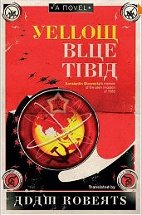Yellow blue tibia by Adam Roberts

Gollancz, 2009. ISBN 9780575083585.
Recommended reading age 16 plus. Yellow blue tibia is a science
fiction
story with historical, slap-stick comedic and deeply philosophical
elements. Early in the story Konstantin Sverecky, a science fiction
author of medium notoriety finds himself cloistered in a dacha with a
group of fellow writers. The Second World War is recently over and the
authors' task is to manufacture a tale of alien invasion with which
Stalin intends to motivate the Soviet people against a common enemy.
The attitude and experience of the authors, most of whom are war
veterans themselves, reflects that of the war-weary and traumatised
surviving Russian populace which suffered unimaginable starvation and
barbarism under Stalin in the 1930s prior to enduring further horrors
from the German invasion.
Stalin personally briefs the authors and explains that in his view,
Soviet people are unstoppable when being attacked and because he
believes the United States will soon fail, a new enemy must be created,
which (being extra-terrestrial), the whole world might focus upon. It
is plain to those involved that to disappoint Stalin is to invite an
immediate grisly end and they set to, creating a fantastic tale of
'Radiation Aliens' which significantly will strike the Ukraine. Before
completion however, the project is shut down, the authors sworn to
secrecy and sent home. The reader appreciates that fear of retribution
makes this plausible and accepts that Sverecky's life continues in a
different direction, working as a translator, becoming a widower
following a disastrous marriage and being sent to a Gulag for no
specific reason beyond being 'suspicious'. Upon his release, another
failed marriage sees him becoming a broken-down, dedicated alcoholic
leading a miserable life. It is years later when translating for Coyne,
an American Scientologist interested in UFOs that Sverecky becomes once
again embroiled in the alien conspiracy as a result of the American's
mysterious death. A series of thrilling and often absurd adventures
unfold, involving an outrageous taxi driver with Asperger's syndrome
who used to be a nuclear physicist, one of the writers from Stalin's
secret group who is now a senior KGB officer and the monstrously fat
Dora Norman who was previously a companion of the deceased Coyne. The
plot is complex and involves intense philosophical analysis of the UFO
phenomenon and the Chernobyl disaster. Roberts portrays the ridiculous
Russian bureaucracy and miserable existence of ordinary people during
the pre-Perestroika period in a way reminiscent of Martin Cruz-Smith.
The plot is often confusing, which has the effect of conveying the
bewilderment of the central character but luckily some incredibly funny
scenes carry the reader through. This is a worthwhile read but the
author's rushed attempt to reconcile reality with imaginative theory in
the final chapter is unconvincing and unsatisfying.
Rob Welsh